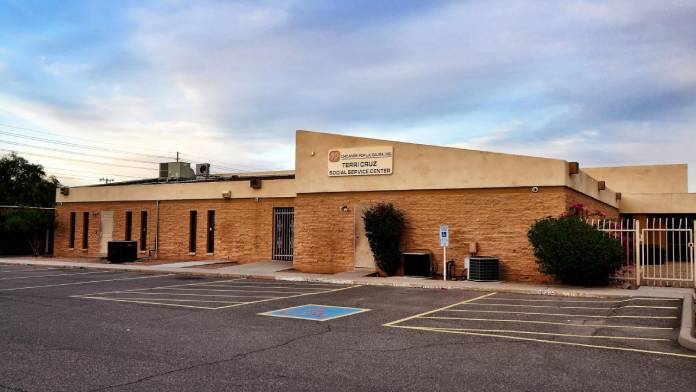Chicanos Por La Causa (CPLC) Corazón

About Chicanos Por La Causa (CPLC) Corazón
Since 1983, Chicanos Por La Causa (CPLC) Corazón has assisted individuals facing substance use challenges in Phoenix, Arizona. Nestled in Phoenix’s Westlake-Sonoran area, this 65-bed residential facility sits just east of the I‑17 freeway. It’s northwest of Encanto Park and less than three miles from both St. Mary’s Basilica and the Rosson House Museum.
This program primarily supports underserved communities and vulnerable populations with little or no financial resources. Survivors of domestic violence, sexual abuse, individuals living with HIV and people with disabilities are welcomed. Folks on medication-assisted treatment (MAT) such as methadone or Suboxone are supported.
They accept Arizona Medicaid and can assist with enrollment. Substance Abuse Block Grant funding is also available to help offset costs for the uninsured.
The facility is ADA-compliant to ensure accessibility for individuals with disabilities. Amenities include onsite laundry facilities, a basketball court for recreation and a peaceful garden space that encourages reflection and connection. Three wholesome meals served daily help nourish residents’ bodies and reinforce their path to lifelong wellness.
Holistic Support for Long-Term Wellness
At Corazón, lifelong stability is achieved through whole-person and recovery-oriented programming that may last between 30 and 60 days. Daily routine includes therapy to develop effective strategies and prevent relapse for long-term stability and personal growth. Holistic practices like yoga, tai chi and qigong help promote emotional balance and physical well-being.
They even incorporate the Native American sweat lodge ceremony, honoring traditional healing practices that support spiritual growth and renewal. You’ll also attend nightly community 12-step support groups. Residents on MAT continue to receive medication as part of an integrated care plan that supports both physical stability and long-term recovery.
Following graduation, you may transition to Grace House, a sober living facility operated by CPLC at the same location. It offers a safe space to live while you seek employment and work toward independent living. Free onsite parking is available.
You may be able to stay up to six months and continue with a case manager to find a job and accommodation as you build a stable path toward independent living.
| Levels of Care | Detox Service Setting | Programs | Payment Options |
|---|---|---|---|
|
Inpatient and residential programs provide round-the-clock medical and emotional support as you live at the treatment facility. This level of care may be recommended if you have severe addictions or mental health conditions since it removes outside distractions and allows you to focus solely on therapy. |
In outpatient therapy, you’ll attend therapy sessions several times each week while living at home. This is ideal if you have a strong support system and a lower risk of relapse. Outpatient treatment offers flexibility to maintain work, school or family obligations. |
||
|
Inpatient detox occurs in a dedicated treatment facility. You’ll live there around the clock and receive intensive medical support and supervision to help manage your withdrawal symptoms. It is suitable for individuals with moderate to severe addictions as it ensures a stable detox environment. |
Outpatient detox gives you access to medically supervised withdrawal services while still allowing you to live at home. You’ll attend a clinic for treatment and monitoring. This flexible option is suitable for those with mild to moderate withdrawal symptoms who have strong support systems. |
||
|
Alcohol detox programs offer medical support to help individuals withdraw safely from alcohol. Your care team may use medications to ease your symptoms and provide medical monitoring to address complications. |
Drug detox programs support individuals who are withdrawing from addictive substances like cocaine and heroin. Medical support helps you manage symptoms in a controlled and safe environment so you can achieve initial sobriety. |
||
|
Private Insurance
|
Self Pay
|
Levels of Care
Inpatient and residential programs provide round-the-clock medical and emotional support as you live at the treatment facility. This level of care may be recommended if you have severe addictions or mental health conditions since it removes outside distractions and allows you to focus solely on therapy.
In outpatient therapy, you’ll attend therapy sessions several times each week while living at home. This is ideal if you have a strong support system and a lower risk of relapse. Outpatient treatment offers flexibility to maintain work, school or family obligations.
Detox Service Setting
Inpatient detox occurs in a dedicated treatment facility. You’ll live there around the clock and receive intensive medical support and supervision to help manage your withdrawal symptoms. It is suitable for individuals with moderate to severe addictions as it ensures a stable detox environment.
Outpatient detox gives you access to medically supervised withdrawal services while still allowing you to live at home. You’ll attend a clinic for treatment and monitoring. This flexible option is suitable for those with mild to moderate withdrawal symptoms who have strong support systems.
Programs
Alcohol detox programs offer medical support to help individuals withdraw safely from alcohol. Your care team may use medications to ease your symptoms and provide medical monitoring to address complications.
Drug detox programs support individuals who are withdrawing from addictive substances like cocaine and heroin. Medical support helps you manage symptoms in a controlled and safe environment so you can achieve initial sobriety.
Contact

Chika Uchendu is a multi-niche and seasoned SEO writer with expertise in personal finance, technology and health. He’s had over 10 years of experience creating impactful content that resonates with diverse audiences. His journalism and digital marketing background enables him to combine data-driven analysis with engaging storytelling. This helps drive engagement and grants target audiences access to valuable information.
Chika has worked for Benzinga, Motley Fool, Webopedia and many other popular online media outlets on a freelance and contractual basis. He is using his voice to drive awareness and meaningful change among people dealing with the pandemic of substance use disorder. Chika is an ambivert who enjoys sports, hiking, reading and video gaming.

Peter W.Y. Lee is a historian with a focus in American Cold War culture. He has examined how popular culture has served as a coping mechanism for the challenges and changes impacting American society throughout the twentieth century.




